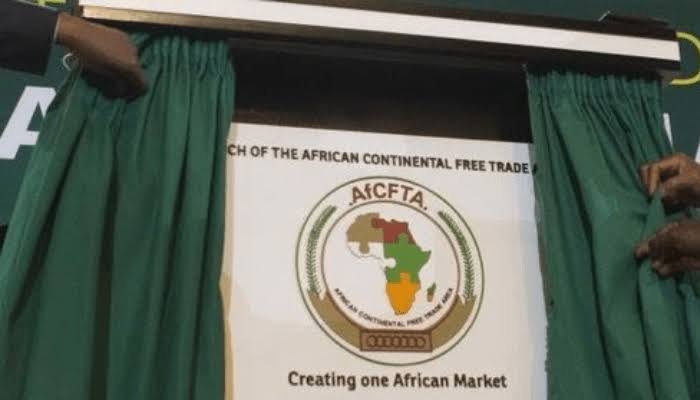
Executive Secretary of the National Action Committee (NAC) on the African Continental Free Trade Area (AfCFTA); Mr Olusegun Awolowo has again assured that Nigeria will begin exporting locally produced commodities to South Africa, Rwanda, Cameroon, and Kenya in April under the Guided Trade Initiative (GTI) of the African Continental Free Trade Area (AfCFTA).
This assurance comes after the country missed several deadlines for joining other African nations in trading under the AfCFTA.
The Guided Trade Initiative (GTI), an interim arrangement designed to test the legal framework and Customs processes of participating state parties before the full implementation of the trade agreement, was officially launched on October 7, 2022.
Recall that Nigeria had missed crucial deadlines for joining the AfCFTA. The country was not part of the first group of nations to begin trading under the GTI in August 2023. Reasons for the delay include unresolved protocols and a need to improve infrastructure for smoother trade facilitation.
However, Nigeria also missed the trading date for the launch of the second phase of GTI, an opportunity to join countries like Rwanda, Cameroon, Egypt, Ghana, Kenya, Mauritius, Tanzania, and Tunisia, which have already commenced trading under the GTI.
These delays according to stakeholders have caused frustration among Nigerian businesses.
While the latest assurance given by Mr Awolowo marks a step forward for Nigeria’s participation in the continental trade agreement, it however highlights ongoing concerns about the country’s preparedness.
Previously, Nigerian businesses have been engaged in informal exports to these countries. However, the GTI will allow for official and formal trade under the AfCFTA framework.
While speaking last week at the Abuja Stakeholders Workshop on the AfCFTA Digital Trade Protocol, the Executive Secretary, National Action Committee on AfCFTA, told journalists that though trading under the main AfCFTA had yet to start, the secretariat of the programme had introduced the Guided Trade Initiative.
He said, “We haven’t started trading in AfCFTA, we are duly going through the protocols. But recently the AfCFTA secretariat itself launched what they call the Guided Trade Initiative to get some countries to start trading outside their regional blocks.
“We’ve signed onto it and I think that by the end of April we are taking a few companies, big, medium and small enterprises to actually launch trading in Africa. All we are doing now is that we are going through and signing all the protocols, as well as finding a way on how to implement them.
“So we are now at the stage of implementation. Therefore, trading hasn’t really commenced under AfCFTA. It is not an overnight thing, you have to go through all the protocols, sign them and agree”.
According to him, Nigeria can not yet trade fully in AfCFTA, but can key into the Guided Trade Initiative (GTI). “We are hoping that we are able to start trading under the GTI, not on the main AfCFTA itself, by the end of April. So it will be on record that Nigeria has now started exporting officially and formally, because, of course, informal trade is going on anyway.”
But, some industry leaders like a former Director-General of the Manufacturers Association of Nigeria (MAN), Mr Remi Ogunmefun, believe the country needs to focus on increasing domestic production before engaging in large-scale continental trade.
Experts have also pointed out potential challenges for Nigeria’s AfCFTA participation. Dr. Segun Musa, Deputy President of Air and Logistics at the National Association of Government Approved Freight Forwarders (NAGAFF), highlights concerns about limited local production capacity and inefficiencies in Nigerian customs operations.
Despite these uncertainties, they believed that Nigeria’s involvement in the GTI signifies progress stating that the initiative will provide a valuable testing ground for the country’s trade capacities and customs procedures. The success of this pilot programme will be crucial in determining Nigeria’s full-fledged participation in the AfCFTA and its potential benefits for the nation’s economy.















